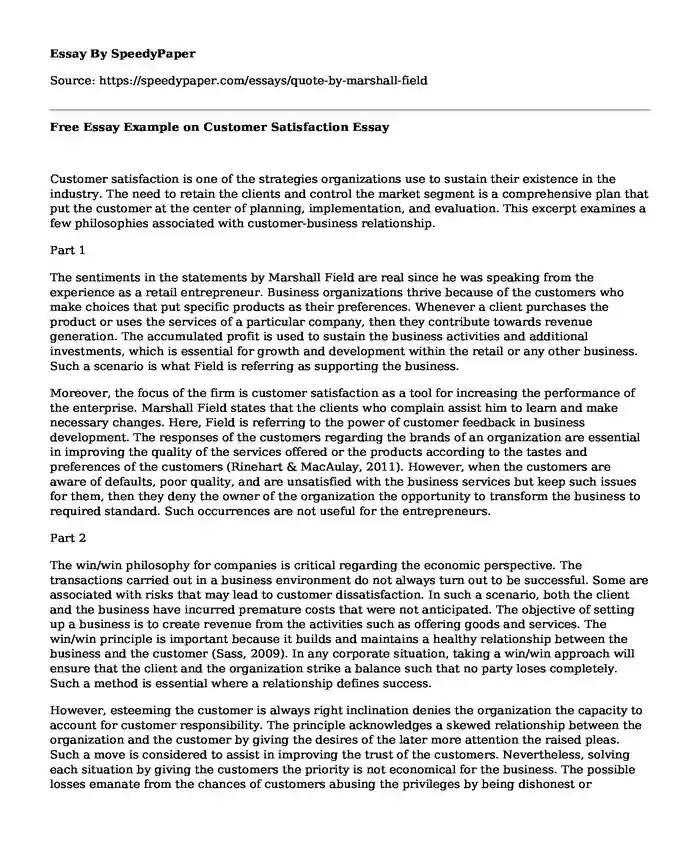
| Type of paper: | Essay |
| Categories: | Marketing Customer service |
| Pages: | 3 |
| Wordcount: | 630 words |
Customer satisfaction is one of the strategies organizations use to sustain their existence in the industry. The need to retain the clients and control the market segment is a comprehensive plan that put the customer at the center of planning, implementation, and evaluation. This excerpt examines a few philosophies associated with customer-business relationship.
Part 1
The sentiments in the statements by Marshall Field are real since he was speaking from the experience as a retail entrepreneur. Business organizations thrive because of the customers who make choices that put specific products as their preferences. Whenever a client purchases the product or uses the services of a particular company, then they contribute towards revenue generation. The accumulated profit is used to sustain the business activities and additional investments, which is essential for growth and development within the retail or any other business. Such a scenario is what Field is referring as supporting the business.
Moreover, the focus of the firm is customer satisfaction as a tool for increasing the performance of the enterprise. Marshall Field states that the clients who complain assist him to learn and make necessary changes. Here, Field is referring to the power of customer feedback in business development. The responses of the customers regarding the brands of an organization are essential in improving the quality of the services offered or the products according to the tastes and preferences of the customers (Rinehart & MacAulay, 2011). However, when the customers are aware of defaults, poor quality, and are unsatisfied with the business services but keep such issues for them, then they deny the owner of the organization the opportunity to transform the business to required standard. Such occurrences are not useful for the entrepreneurs.
Part 2
The win/win philosophy for companies is critical regarding the economic perspective. The transactions carried out in a business environment do not always turn out to be successful. Some are associated with risks that may lead to customer dissatisfaction. In such a scenario, both the client and the business have incurred premature costs that were not anticipated. The objective of setting up a business is to create revenue from the activities such as offering goods and services. The win/win principle is important because it builds and maintains a healthy relationship between the business and the customer (Sass, 2009). In any corporate situation, taking a win/win approach will ensure that the client and the organization strike a balance such that no party loses completely. Such a method is essential where a relationship defines success.
However, esteeming the customer is always right inclination denies the organization the capacity to account for customer responsibility. The principle acknowledges a skewed relationship between the organization and the customer by giving the desires of the later more attention the raised pleas. Such a move is considered to assist in improving the trust of the customers. Nevertheless, solving each situation by giving the customers the priority is not economical for the business. The possible losses emanate from the chances of customers abusing the privileges by being dishonest or overusing the opportunity. The business is a high risk of unplanned expenses whenever the customers advance unrealistic expectations especially when they are aware that they are guaranteed (Wilson, 2016). Therefore, corporate organizations should consider the win/win approach since it assists the business to cover the associated costs to some degree as well as maintain the existing relationship with the customers.
References
Rinehart, S. M., & MacAulay, K. D. (2011). The success of chains: Customer loyalty or customer comfort? Journal of Business & Economics Research (JBER), 2(3). http://doi.org/10.19030/jber.v2i3.2867
Sass, M. (2009). Integration is not collaboration: Implication for win-win negotiations. SSRN Electronic Journal. http://doi.org/10.2139/ssrn.1100736
Wilson, C. (2016). When the customer isnt always right. New Scientist, 230(3072), 21. http://doi.org/10.1016/s0262-4079(16)30808-9
Cite this page
Free Essay Example on Customer Satisfaction. (2019, Oct 15). Retrieved from https://speedypaper.net/essays/quote-by-marshall-field
Request Removal
If you are the original author of this essay and no longer wish to have it published on the SpeedyPaper website, please click below to request its removal:
- Essay Sample Describing the Citibank Forex Losses Case Study
- Best Place to Live in USA Essay Sample
- Age of Maturity, Essay Sample
- Free Essay about Roosevelt Franklin
- Free Essay on Economic Exposure and Impacts on Companies
- Essay Example for Students: Racism in America
- Essay Sample on Prevalence of Food-Borne Infections
Popular categories




